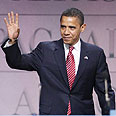
Jewish impact on US democracy
Jewish participation in US politics greater than in any European country
Intense Jewish participation in US elections has been nurtured by home-court conditions: The US considers Judaism a key factor in the foundation of its cultural, ideological, legal and political systems.
The trilateral covenant among the US, the Jewish people and the Jewish State was established by the Puritans during the 17th century, expanded by the Founding Fathers and sustained until today.
A marble replica of Moses’ head is featured at the House Chamber on Capitol Hill, facing the seat of the House Speaker.
The sculpture of Moses, holding the Tablets, hangs above the table of the US Supreme Court Justices. A granite rock, shaped like the Two Tablets, welcomes visitors to the Texas Legislature in Austin. In fact, a US Federal Judge rejected an appeal to relocate the rock (lest it violate, supposedly, separation of Church and State), contending that it was not a religious monument, but rather an evidence of the moral-cultural foundation of Texas and the US.
The Bible in particular, and Judaism in general, have inspired the US Constitution, the centrality of Liberty and the Bill of Rights, as well as Western democracy. The Puritans, who founded the 13 Colonies, highlighted the legacy of The Exodus. They considered Britain, the Atlantic Ocean and America to be modern-day Egypt, Red Sea and the Promised Land.
The authors of the Constitution were inspired by the political structure of the 12 Jewish Tribes in the desert, who were governed by Moses the Executive, Aharon, the Priests and the Legislature of 70 elders. They regarded themselves as “the modern-day People of the Covenant.” Hence, the term “Federalism,” a derivative of the Latin word for “Covenant” – Foedus.
Judaism a competitor at best
Thomas Paine, the author of “Common Sense”, the 1776 moral and intellectual touchstone, articulating the case against British Monarchy, referred to the Prophet Samuel and to the Judge Gideon (e.g. “For the will of the Almighty as declared by Gideon, and the Prophet Samuel, expressly disapproves of government by kings.”).
The US is the most religious Western country, which views the Old and the New Testaments as civilian cornerstones. Over 1,000 towns and other locations bear biblical names, such as Salem (Jerusalem), Zion, Beth El, Dothan, Efrata, Hebron, Jericho, Canaan, Pisgah, etc. Ninety percent of Americans believe in G-D, 80% hold Judeo-Christian beliefs, 86% wish to keep “In God We Trust” on US currency, “Endowed by the Creator” in the Declaration of Independence and “One Nation Under God” in the “Pledge of Allegiance.”
Over 40% frequent church on Sundays, exposed to biblical sermons, and 15 million copies of the Bible are sold annually in the USA. The Liberty Bell bears an inscription from Leviticus 25:10: “Proclaim liberty throughout the land and unto all the inhabitants thereof,” which inspired the anti-slavery movement in general and Harriet Beecher Stowe’s Uncle Tom’s Cabin in particular.
Lowell Thomas, the US radio icon, told his listeners on May 14, 1948: Today, as the Jewish State is established, Americans read through the Bible as a historical reference book.
American leaders often quote from the Bible on the merit of the Bible and on the merit of politics, since the US public respects the Bible. For instance, FDR stated, during a 1935 Fireside Chat: “We cannot read the history of our rise and development as a nation without reckoning with the place the Bible has occupied in shaping the advances of the Republic.”
In January 2001, Senator Mitch McConnell introduced President Bush at a Senate luncheon: “We trust that you shall lead us in the best tradition of Joshua and Caleb.” David’s lamentation featured prominently during the eulogies for George Washington and Lincoln, and President Bush mentioned Abraham, Moses, David and Jeremiah during his May 2008 speech at the Knesset.
In contrast with Europe’s Christianity, which considers Judaism a competitor at best and a foe at worst, US Christianity considers Judaism an ally in principles and values. Such a state-of-mind has facilitated a most successful integration of Jews into every aspect of US society, including the political arena.
Such a reality has maximized Jewish voting turnout and has enhanced political participation by Jewish voters, advisors, contributors and publicists, much more than is displayed by any Jewish European community.










